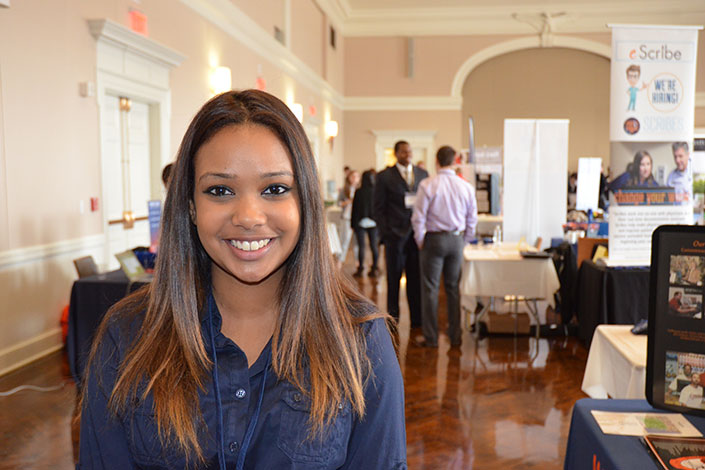This year, the University of Virginia successfully piloted a “Career Communities” program that will change the way career services are delivered to undergraduate students and promises to provide a unique model among peer public universities.
The concept addresses many typical challenges associated with liberal arts career advising, which, as Associate Director of Career Communities Kate Melton put it, can be a bit “messy.” Students’ career interests often extend well beyond their major or school, and there is a constant scramble for the internships and job experiences increasingly demanded by employers.
“To me, that is what makes it exciting,” Melton said.
The Career Communities concept groups career resources by industry, rather than by major or school. Career-related programming will consistently connect students from any discipline to alumni, faculty and employers in a particular field.
“Students need connections and experience,” said Everette Fortner, U.Va.’s associate vice president of career and professional development. “A career community offers those connections to lead to experience.”
The pilot program, led by Melton, focused on the creative arts, media and design. Offerings included small group meetings with alumni, a large interview forum held in partnership with the School of Architecture, one-on-one advising sessions, targeted job and internship listings, and a Spring Break job trek to Richmond to meet with museum directors, theater managers, gallery owners and other potential employers. Approximately 1,000 students participated in the pilot, hailing from a variety of schools and majors.
“So far, students and professionals have responded really well,” said Elizabeth Roettger, an architecture professor who worked with Melton to plan the interview forum. The more topical approach, she said, allows the Architecture School to reach a broader community interested in design, and allows architecture students to more easily explore related careers in other fields.
First-year student Brenna Monk attended the Richmond job trek to explore careers in the arts.
“I learned a lot about different jobs opportunities and potential internships,” she said. “It really gives students an opportunity to meet with influential people who can open many doors.”
The Richmond trip was “a boutique trial for what we hope to make a bigger program of career treks,” Melton said. “I am looking forward to taking the ideas that we started with this year and expanding them in the coming years.”
This fall, University Career Services will launch five additional career communities, focusing on business; education; public service; government and law; and engineering, science and technology. Each will have between one and three designated career advisers who will provide specialized career counseling, coordinate programming with alumni and employers and facilitate targeted job and internship opportunities.
“We want to provide curated resources much more specific to individual industries that we know our students are interested in and to help our counselors develop specialties in those industries,” Melton said.
Mary Winston Richardson, a third-year student majoring in art history and media studies and interested in art business, appreciated that specialization as she worked with Melton on summer internship applications. “When I learned Ms. Melton specifically assists those interested in the arts, I felt welcomed to return to Career Services for a more tailored experience,” she said.
After working with Melton on her resumes and essays, Richardson secured a summer internship with Sotheby’s New York auction house.
Her story is a success that Fortner and his team hope to replicate many times over.
“No matter what a student’s career interests are, we want to be able to connect that student to one or more career communities for career and professional development targeted to those interests,” Fortner said. “Over time, we hope that students will begin to take ownership of the communities, offering to help one another and making connections directly to alumni and employers.”
This summer, University Career Services will also launch the University of Virginia Internship Center and scale up Virginia Alumni Mentoring, also piloted this year. The internship center will help students and faculty to facilitate internship opportunities, while the mentoring program will pair more than 800 U.Va. alumni with third-year students interested in their field of work.
Eventually, Fortner hopes to add career communities for students interested in health care and entrepreneurship, and to offer workshops and other non-credit courses connected with each community, all aimed at leading to more experiential learning, more job and internship postings, and more jobs for U.Va. graduates.
Media Contact
Article Information
April 16, 2015
/content/new-uva-career-communities-shake-liberal-arts-career-services

